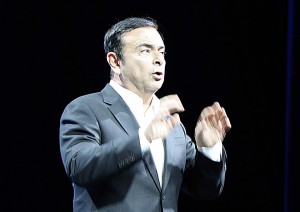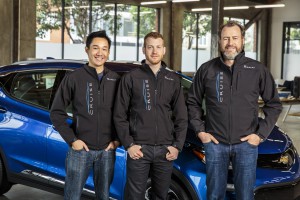
Carlos Ghosn, CEO of the Renault-Nissan-Mitsubishi Alliance, will discuss plans for its $200 million mobility tech fund at CES.
These are challenging times for even the most well-funded automakers. The industry is expected to change more during the next decade than it has during the last century, and carmakers need to stay on top of technologies such as electrification, connected cars and autonomous vehicles, never mind business shifts, such as the rise of car- and ride-sharing services such as Car2Go, Uber and Lyft.
That’s leading the Renault-Nissan-Mitsubishi Alliance to set up a $200 million mobility tech fund, according to a report by the Reuters news service. The alliance’s CEO Carlos Ghosn is expected to announce details during a news conference at the Consumer Electronics Show in Las Vegas early next week.
Separately, officials with the Franco-Japanese alliance announced plans to set up a consortium aimed at putting robo-taxis into commercial use. Among other things, that could include existing ride-share services like Uber and Lyft, as well as Waymo which is developing its own autonomous and driverless technologies. The Google spinoff has said it does not plan to produce its own vehicles.
Renault, Nissan and Mitsubishi have all, to varying degrees, targeted the major trends expected to reshape the automotive business. But while they are running major, in-house R&D efforts they’ve also come to recognize that they can’t stay on top of everything.
(VW, Hyundai team up with former Google self-driving tech guru. Click Here for the story.)
The tech fund Reuters is reporting wouldn’t be the first time automakers have set up efforts to search out and then support start-ups and other tech companies. BMW’s iVentures fund, for example, has about $600 million to spend on things like autonomous vehicle software and smart charging. General Motors has set aside $240 million for its GM Ventures, and PSA Group and Ford have their own funds in play.

The race to bring the first fully autonomous vehicle to market is heating up. GM spent $1 billion to acquire Cruise Automation as part of their effort.
These funds can be used to back up new start-ups or acquire promising intellectual property. Automakers have also shown a willingness, in some cases, to acquire promising firms. GM, for example, acquired San Francisco-based Cruise Automation, an autonomous software start-up, for $1 billion early in 2017. Ford made a similar purchase last year. Automakers are also partnering with potential allies. Earlier this week, Hyundai and Volkswagen confirmed they were allying with new autonomous research firm Aurora Innovation, a San Francisco start-up.
The new corporate venture capital, or CVC, fund “will allow us to move faster on acquisitions ahead of our competition,” a source at the Renault-Nissan-Mitsubishi Alliance told Reuters.
According to the wire service, the French automaker will put up 40% of the $200 million, Nissan another 40%, Mitsubishi covering the remainder. The fund will be based in the Netherlands and reportedly will be headed by Francois Dossa, a former banker with Societe Generale.
(New study sees 21 million autonomous vehicles on the road by 2035. Click Here for the latest.)
The move is a shift, especially for Nissan, which had generally avoided working with start-ups. But as BMW and GM have both decided, some critical breakthroughs could emerge from new companies – like Aurora, which is headed by Chris Urmson, the former self-driving car chief at Google.
Autonomous technology is expected to be a critical target for the new alliance venture fund. Nissan has positioned itself as a leader in the field but now says it won’t have its first fully autonomous vehicle in production until 2022. GM, by comparison, hopes to have its first fully driverless model ready to go into ride-sharing fleets by 2019.
The members of the Renault-Nissan-Mitsubishi Alliance have been pushing to speed things up by developing new partnerships, however. Nissan will begins testing autonomous cabs this year near its headquarters in Yokohama in partnership with tech firm DeNA Co. And Renault has partnered with France’s Transdev on similar projects.
The French and Japanese consortium hopes to line up partners who will help put its vehicles into even wider fleet use, and will announce more details in the coming months, Ogi Redzic, a senior vice president overseeing the group’s autonomous program, told the Bloomberg news service.
(To see more about autonomous tech coming to CES 2018, Click Here.)
There is plenty of debate over just how soon autonomous and even more advanced driverless vehicles will be ready for real-world service, but automakers are being forced to rethink what those vehicles will mean to their long-term business model. It is generally expected that driverless technology will allow services like Uber, Lyft and China’s Didi Chuxing to slash the cost of their operations to the point where it would be cheaper to hail a ride than to own a private vehicle. According to a recent study by the Boston Consulting Group, 20% of the miles Americans clock on the road each year will be in driverless ride-share vehicles by 2030.
